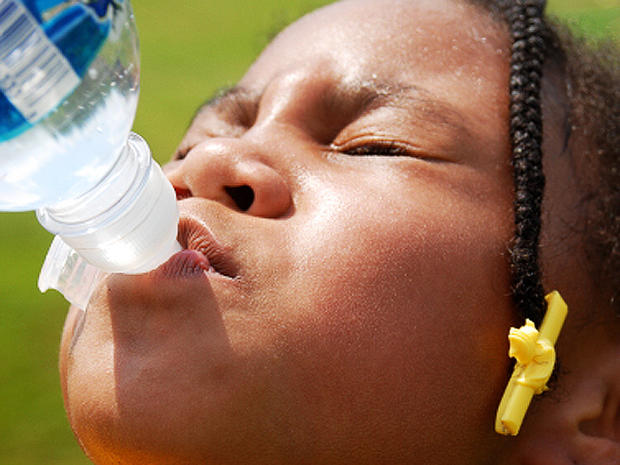Heat wave hits East Coast to kick off summer: How to stay safe
(CBS/AP) A heat wave has hit the East coast to kick off the official start of summer on Wednesday.
The hot spell arrived on the summer solstice in an area that's home to some of the nation's most densely populated cities. Temperatures hit the mid- to high 90s along the eastern seaboard, including New York City, Boston, Philadelphia and Washington, D.C.
Cities around the coast are taking safety measures such as setting up public cooling centers in dozens of cities for those without air conditioning.
In a rare exception to its no-drinks policy, the Metro in Washington, D.C. said passengers on Wednesday and Thursday would be allowed to drink water. The National Weather Service said the temperature at Washington National Airport was 95 degrees just before 2 p.m., though it felt like 99.
According to the National Weather Service, in New York City's Central Park, the temperature was 93 degrees, but with humidity it felt like 97. In Boston, it felt like 100 but was 93. In Washington, it felt like 101 but was 97.
In downtown Providence, R.I., at the central bus terminal, a worker for the Salvation Army - red-faced and hot herself - was handing out free bottles of water, reminding people to stay hydrated. Users of public transit were enjoying free service on buses and trolleys, offered on days when air quality may be unhealthy.
In Philadelphia, the city's highs in the next couple of days could break decades-old records of 98 degrees, set in 1931, and 99, set in 1923. Normally, the high for Philadelphia is about 84 degrees.
The wilting heat is also expected to hit Boston-area residents hard. Temperatures up to 97 degrees were forecast for Wednesday, followed by 99 on Thursday.
If you live in one of these areas, how can you protect yourself from extreme heat?
The Centers for Disease Control and Prevention says it's important monitor those who are most at risk for heat-related illnesses, including elderly people, people with chronic medical conditions, overweight individuals and infants and children. People should never leave infants, children or pets in a parked car on a hot day because temperatures can rise rapidly, causing major health risks.
"Be sure to check on elderly patients frequently as they are more prone to develop dehydration," Dr. Robert Glatter, an emergency medicine physician at Lenox Hill Hospital in New York City said in an email. "Multiple meds which elderly patients take including diuretics and certain types of blood pressure meds can interfere with the ability to cool the body and impair sweating, potentially leading to heatstroke."
Dr. David Friedman, chief of heart failure services at North Shore-LIJ'S Plainview Hospital in Plainview N.Y. said in an email that patients who've had heart problems are especially at risk.
"Certain heart patients, such as those with heart failure and poor heart function, can be potentially prone to blood pressure and body fluid changes under these tough weather conditions," he said.
Regardless of if you're high-risk, the CDC recommends staying indoors in a cool, air-conditioned place (if possible) and drinking plenty of fluids, even if you aren't thirsty. Avoid alcohol or sugary drinks because they can make you lose body fluid, and stay away from very cold drinks because they might cause cramps. If you're feeling dehydrated from the heat, a sports drink could replace depleted salts and minerals.
It's also important to wear lightweight, light-colored and loose-fitting clothing on a really hot day, along with sunscreen. Sunburn can affect your body's ability to cool itself and cause loss of bodily fluids (besides raising your risk for skin damage or cancer). A wide-brimmed hat with sunglasses could help those who must go outdoors remain protected.
The most troublesome heat-related disorder is heat stroke, which occurs when a person's body temperature keeps rising and sweating fails to cool the body, allowing temperatures to reach 106 degrees or higher within 15 minutes. Warning signs include dizziness, nausea, confusion, throbbing headache, elevated body temperature, rapid pulse, and skin that's red, hot and dry and isn't sweating.
If experiencing nausea or muscle cramping from the heat, Glatter recommends using a misting spray with a fan to rapidly cool down. But if people are experiencing symptoms of heat stroke, they need immediate medical attention and should call 911.
The CDC has more on heat-related illnesses and how to protect yourself.
